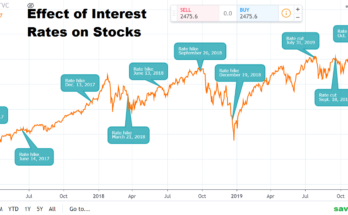In the realm of finance, the idea of a market is crucial, to economic activities. This comprehensive piece seeks to demystify the complexities of markets offering an in-depth look at their varieties, roles, players, operations, advantages, drawbacks, contemporary patterns, and additional aspects. Whether you’re an investor craving understanding or a novice aiming to grasp the basics this manual is crafted to provide a thorough and captivating journey, into the world of financial markets.
Introduction to Financial Markets
Financial markets play a role, in the economy serving as hubs where different financial tools are exchanged among investors, institutions, governments, and businesses. Essentially these markets support the movement of capital and risk allowing for the distribution of resources and encouraging development. Having a grasp of how financial markets operate is essential, for individuals and organizations engaged in investing raising capital managing risk, and analyzing the economy.
Types of Financial Markets
Stock Markets
Equity markets, normally known as inventory markets serve as systems, for the trading of shares of listed companies. They allow agencies to elevate funds via the issuance of shares permitting buyers to engage in possession and doubtlessly proportion income. Prominent stock exchanges like the New York Stock Exchange (NYSE) and NASDAQ hold influence, in the buying and selling of equities.
Bond Markets
Bond markets address the issuance buying and selling of debt securities. Bonds represent loans made through traders to governments, municipalities, or corporations, with fixed interest bills over a targeted period. They are critical for financing infrastructure projects, government prices, and company expansions.
Foreign Exchange Markets (Forex)
Forex markets contain the change of currencies, facilitating worldwide change and funding. The most actively traded currencies include the US dollar, euro, Japanese yen, British pound, and Swiss franc. Geopolitical events, monetary signs, and vital financial institution policies impact forex markets.
Derivatives Markets
Derivatives are economic contracts whose price is derived from an underlying asset or benchmark. Common derivatives consist of futures contracts, options, swaps, & forwards. Derivatives are used for hedging, hypothesis, and risk control functions, presenting flexibility and publicity to various asset lessons.
Commodities Markets
Commodities markets involve the trading of bodily goods consisting of agricultural products (e.g., wheat, corn), energy sources (e.g., oil, natural fuel), metals (e.g., gold, silver), and livestock. Commodity fees are prompted by way of delivery and demand dynamics, climate situations, geopolitical elements, and global financial trends.
Money Markets
Short-term borrowing and lending are the sports, in money markets, which specifically contain dealing with liquid and low-threat financial tools. Examples of cash marketplace instruments are treasury payments, certificates of deposit, and paper and repurchase agreements. The number one characteristic of money markets is to handle liquidity and brief-time period investment requirements.
Functions of Financial Markets
Capital Raising
Financial markets provide companies and governments with avenues to raise capital through the issuance of stocks, bonds, & other securities. This capital enables businesses to fund operations, expand infrastructure, invest in research and development, and pursue growth opportunities.
Liquidity Provision
In markets, investors can easily trade assets, which boosts liquidity. This smooth operation allows investors to enter and exit positions effectively supporting price discovery and market efficiency.
Price Discovery
Financial markets play an important position in figuring out the prices of economic assets based totally on delivery and demand dynamics, market sentiment, fundamental analysis, and technical factors. Price discovery mechanisms make sure that belongings are valued as they should be and reflect marketplace basics.
Risk Management
Financial markets offer tools and contraptions for threat control, together with derivatives, coverage merchandise, diversification strategies, and hedging techniques. Investors use those gears to mitigate risks which include market volatility, credit score defaults, interest price fluctuations, and foreign money fluctuations.
Information Dissemination
Financial markets serve as data hubs, disseminating news, facts, and analysis that affect asset charges and funding decisions. Market participants rely on well-timed and correct records to make knowledgeable choices and adapt to converting marketplace situations.
Efficient Allocation of Capital
Financial markets allocate capital to its most productive uses, directing funds towards companies, industries, and projects with high growth potential and economic viability. Efficient capital allocation fosters innovation, entrepreneurship, and economic development.
Participants in Financial Markets
Individual Investors
Individual buyers, from retail investors to high-net-worth individuals, actively participate in financial markets using brokerage accounts, investment platforms, and trading apps. They contribute to market liquidity, price discovery, and market sentiment.
Institutional Investors
Institutional buyers manipulate big pools of capital on behalf of customers, inclusive of pension funds, mutual price ranges, insurance corporations, endowments, and hedge finances. They play a significant function in asset allocation, portfolio control, and marketplace stabilization.
Brokers and Dealers
Brokers and dealers streamline monetary market transactions by means of connecting consumers with sellers, executing trades, ensuring liquidity, and imparting marketplace-making services. Acting as intermediaries, brokers execute orders and provide buying and selling services to bridge buyers with the market.
Regulators
Regulatory groups screen financial markets, ensuring compliance with criminal, regulatory, & moral requirements. Regulators’ goal is to preserve market integrity, guard buyers, save you from fraud and abuse, and promote honest and obvious markets. Regulatory bodies consist of the Securities and Exchange Commission (SEC), the Financial Conduct Authority (FCA), and the European Securities Markets Authority (ESMA).
How a Financial MarketWork
Financial markets operate through mechanisms and mechanisms that facilitate trade, settlement, liquidation, and pricing. Market participants interact through electronic trading systems, exchanges, broker-dealer networks, and over-the-counter (OTC) markets. Key elements of financial market activity include:
Trading Mechanisms
Trading takes place electronically, where buyers and sellers place orders to buy and sell financial assets. Market orders, limit orders, stop orders, and market-on-close orders are common types of orders investors use to execute trades.
Market Structure
Financial markets have diverse structures, including centralized exchanges (e.g., NYSE, NASDAQ), decentralized markets (e.g., OTC markets), alternative trading systems (ATS), & dark pools. Market structure impacts liquidity, transparency, and order execution in various ways.
Participants
Market participants include individual investors, traders, lenders, intermediaries, and algorithmic systems. Each contributes to market growth and price discovery.
Settlement and Clearing
Settlement and clearing processes ensure the finalization and completion of the trade, involving security and clearance between the buyer and seller. Clearinghouses, custodians, and settlement systems play a role in transaction settlement and risk management.
Market Regulations
Financial markets allocate capital to its most effective uses, directing funds closer to organizations, industries, and tasks with high increase capability and economic viability. Efficient capital allocation fosters innovation, entrepreneurship, and monetary development.
Benefits of Financial Market
Capital Formation
Financial markets facilitate capital formation by connecting savers & investors, allowing businesses & governments to raise funds for investment, expansion, and innovation. Capital formation fuels economic growth, job creation, and productivity enhancements.
Risk Diversification
Financial markets offer opportunities for risk diversification, allowing investors to spread their investments across different asset classes, sectors, regions, and currencies. Diversification reduces portfolio volatility and exposure to specific risks, enhancing overall risk-adjusted returns.
Market Liquidity
Financial markets provide liquidity, allowing investors to buy or sell assets without significantly impacting prices. Liquidity ensures market efficiency, price stability, and timely execution of trades, benefiting investors and market participants.
Price Discovery
Financial markets contribute to price discovery, reflecting the collective information, expectations, and sentiments of market participants. Price discovery mechanisms ensure asset prices reflect fundamental factors, market trends, and supply-demand dynamics.
Investment Opportunities
Financial markets offer a wide range of investment opportunities, including equities, bonds, currencies, commodities, real estate, derivatives, and alternative assets. Investors can diversify their portfolios, pursue investment strategies, and access global markets.
Capital Efficiency
Financial markets promote capital efficiency by allocating resources to projects, companies, and initiatives with the highest returns on investment. Efficient capital allocation fosters economic development, innovation, and resource utilization.




